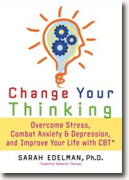Change Your Thinking
Sarah Edelman
book reviews:
· general fiction
· chick lit/romance
· sci-fi/fantasy
· graphic novels
· nonfiction
· audio books
· author interviews
· children's books @
curledupkids.com
· DVD reviews @
curledupdvd.com
newsletter
win books
buy online
links
home
for authors
& publishers
for reviewers

 |
Change Your Thinking: Overcome Stress, Anxiety, and Depression, and Improve Your Life with CBT Sarah Edelman Marlowe & Company Paperback 320 pages August 2007 |
|
Dr. Sarah Edelman is a psychologist who has chosen Cognitive Behavior Therapy (CBT) as a practical, effective way to help you (as the book's subtitle proclaims) "overcome stress, anxiety and depression, and improve your life." Few people can seriously assert that they've never experienced stress, anxiety and at least some form of depression, and most of us would like to improve our lives, so this would seem to be an Important Book.
Since all systems come with their fair share of jargon, you will not be surprised that in order to get in the swing of CBT, you will need to ingest some new unconventional vocabulary. Central to the functions of CBT are the terms "awfulize" and "catastrophize," denoting our tendency to exaggerate the negative aspects of any given situation then to leap to the worst possible conclusions. This negative way of assimilating life's events can lead to paralyzing frustration, especially if you have LFT (low frustration tolerance). The author postulates that many modern Americans have LFT owing to having been spoiled rotten (my terminology) as children - in other words, never or rarely ever having had to endure anything much worse than a traffic jam, a barking dog or a sticking cabinet door. Otherwise intelligent people with LFT can rapidly make the mental leap from traffic jam to late to work, loss of job, loss of income, poverty, disgrace and death in a ditch. And it's all someone else's fault. Long before you succumb to such negative thinking, Dr. Edelman will teach you to "identify and challenge anger producing cognitions," such as "I should always be treated fairly," "I shouldn't be inconvenienced," or, "other people should always do what I think is right." One method for isolating and combating such cognitions is to posit logical statements such as, "It's nice when things go well for me... but hassles are a part of life." Since everyone is, as noted above, prone to some negative thinking and reactive behavior patterns that serve to make situations worse, this book could be a useful guide for all of us. But it will be more helpful to those who are struggling with structural life challenges such as relationship crashes, unmanageable grief, or unsociable anger. For such sufferers, there are handy assessment tools, charts and written exercises. CBT does not require wholesale "positive thinking." It allows you to grade yourself on the curve, acknowledging that for a very depressed person, just being able to think "today wasn't a total disaster" may represent great progress. Overall, though, CBT does require its practitioners to have faith that negative cognitions, whatever their source, can be recognized, understood and over-ridden. Change Your Thinking Originally published on Curled Up With A Good Book at www.curledup.com. © Barbara Bamberger Scott, 2007 |
|
|
|
 Click here to learn more about this month's sponsor! |
|
| fiction · sf/f · comic books · nonfiction · audio newsletter · free book contest · buy books online review index · links · · authors & publishers reviewers |
|
| site by ELBO Computing Resources, Inc. | |
 Here is how Wikipedia describes CBT: "The particular therapeutic techniques vary according to the particular kind of client or issue, but commonly include keeping a diary of significant events and associated feelings, thoughts and behaviors; questioning and testing cognitions, assumptions, evaluations and beliefs that might be unhelpful and unrealistic; gradually facing activities which may have been avoided; and trying out new ways of behaving and reacting. Relaxation and distraction techniques are also commonly included. CBT is widely accepted as an evidence and empirically based, cost-effective psychotherapy for many disorders and psychological problems." In
Here is how Wikipedia describes CBT: "The particular therapeutic techniques vary according to the particular kind of client or issue, but commonly include keeping a diary of significant events and associated feelings, thoughts and behaviors; questioning and testing cognitions, assumptions, evaluations and beliefs that might be unhelpful and unrealistic; gradually facing activities which may have been avoided; and trying out new ways of behaving and reacting. Relaxation and distraction techniques are also commonly included. CBT is widely accepted as an evidence and empirically based, cost-effective psychotherapy for many disorders and psychological problems." In